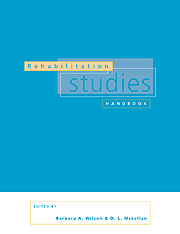Book contents
- Frontmatter
- Contents
- List of contributors
- 1 Introduction to rehabilitation
- 2 Disabled people in society
- 3 Disability equality training
- 4 Towards a therapeutic alliance model of rehabilitation
- 5 Rehabilitation education: a learner-centred approach
- 6 Work, occupation and disability
- 7 Management in rehabilitation
- 8 Research and evaluation in rehabilitation
- 9 Statistical methods
- 10 Social policy, disability and rehabilitation
- 11 Principles of the acquisition of sensorimotor skills
- 12 Management of acquired cognitive disorders
- 13 Challenging behaviour: helping people with severe brain damage
- 14 Pain
- 15 The multiply handicapped child
- 16 The transition to adult life
- 17 Factors specific to disabled elderly people
- Index
6 - Work, occupation and disability
Published online by Cambridge University Press: 06 November 2009
- Frontmatter
- Contents
- List of contributors
- 1 Introduction to rehabilitation
- 2 Disabled people in society
- 3 Disability equality training
- 4 Towards a therapeutic alliance model of rehabilitation
- 5 Rehabilitation education: a learner-centred approach
- 6 Work, occupation and disability
- 7 Management in rehabilitation
- 8 Research and evaluation in rehabilitation
- 9 Statistical methods
- 10 Social policy, disability and rehabilitation
- 11 Principles of the acquisition of sensorimotor skills
- 12 Management of acquired cognitive disorders
- 13 Challenging behaviour: helping people with severe brain damage
- 14 Pain
- 15 The multiply handicapped child
- 16 The transition to adult life
- 17 Factors specific to disabled elderly people
- Index
Summary
Hypothesis
Rehabilitation is incomplete if the programme ignores the disabled person's own occupation plan.
Introduction
Clarke (1982) in his book Work in Crisis tries to analyse the significance of work, as a prelude to a study of the problems of the many unemployed people in the United Kingdom (UK). He says:
Work is important because it provides us with a social arena in which a number of basic human needs are met.
He then emphasises eight particular functions of employment that may appeal to people, and explains why people continue to work. Some of his ideas overlap with a list of six functions of work presented by Hayes & Nutman (1981) who were also concerned with unemployment. These two lists have been put together, with some more that I have added (Table 6.1). It is very significant that ten of the 11 functions can equally apply to people busy with occupations (hobbies, interests and voluntary work) where they still gain a great deal of benefit from what they do, without regular payment. Money is not the only result of work. If we therefore study the importance of occupation to people, and include paid or unpaid work, then the subject becomes much wider than the political and economically-determined one of employment. My hypothesis relates to occupation in this wider sense, rather than simply paid work.
Income
A job is the ‘key to the kingdom of consumption, it is the admission ticket by which the individual gains entrance to the goods and services the society produces’ (Cox, 1966). Money must be a major reason why people continue to do difficult or demanding jobs.
- Type
- Chapter
- Information
- Rehabilitation Studies Handbook , pp. 115 - 142Publisher: Cambridge University PressPrint publication year: 1997



